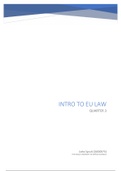INTRO TO EU LAW
QUARTER 3
Lieke Spruit (16030575)
THE HAGUE UNIVERSITY OF APPLIED SCIENCES
,Lieke Spruit (16030575) Introduction to EU Law
Table of Contents
LECTURE 1 ........................................................................................................................................................ 3
LECTURE 2 ...................................................................................................................................................... 14
LECTURE 3 ...................................................................................................................................................... 21
LECTURE 4 ...................................................................................................................................................... 29
LECTURE 5 ...................................................................................................................................................... 37
LECTURE 6 ...................................................................................................................................................... 44
2
,Lieke Spruit (16030575) Introduction to EU Law
Lecture 1
The origins of EU and its development
From Berlin to the first European Community
After WWII: desire for lasting peace in Europe, result in many initiatives aimed at international
cooperation.
• Political and economic cooperation and development between nation states was regarded as
crucial to replace the economic competition that was viewed as a major factor in the outbreak
of wars between European nation states.
1945: United Nations
1945: International Monetary Fund (IMF)
1947: General Agreement on Tariffs and Trade (GATT Treaty)
1947: Marshall Plan (US funded European Recovery Program, channelled through OEEC)
1948: Organisation for European Economic Co-operation (OEEC); in 1960 changed into
Organisation for Economic Co-operation and Development (OECD)
1949: North Atlantic Treaty Organization (NATO)
1949: Treaty of Brussels; establishing Western European Union (WEU) in 1954
1949: Council of Europe, establishing the European Convention on Human Rights in 1953
These efforts were clearly aims either in regards to political or economic cooperation and development.
With the European Communities, their purposes were not so distinctly discernible.
• There was a conflict of opinion: those who wished to see European integration take the form
of a much more involved model vs. those who wished merely to see a purely economic form of
integration.
The first European Community: ECSC
In 1950, Schuman (and Monnet) proposed a plan to link the French and German coal and steel
industries, under the control of a supranational body (the Schuman Plan)
• This would not only help economic recovery, but also remove the disastrous competition
between the two states.
o It would make future war materially impossible, because it put control over coal and
steel production, which was then still vital for the production of armaments and thus
the capability of waging war.
The plan was open for other European countries to join in its discussion. Six nations went ahead to sign
the European Coal and Steel Community (ECSC) in Paris in 1951, which entered into force on 1 January
1952.
• Germany, France, Belgium, the Netherlands, Luxembourg and Italy.
• First form of integration that was both politically and economically motivated.
The ECSC was a mix of both intergovernmental and supranational integration. The four institutions
included:
• High Authority (executive); supranational, body of 9 independent appointees of the 6 MS, able
to adopt binding decisions
3
, Lieke Spruit (16030575) Introduction to EU Law
• Assembly (Parliament)
• Council (of Ministers); intergovernmental, representing the MS
• Court of Justice.
Supranationalism vs intergovernmentalism
Intergovernmentalism:
• Focus on protection State power, national interests
• States are the key actors
• Decisions require unanimity
• Decisions are rarely enforceable, and if so only between States, not their citizens.
Supranationalism:
• Supranational institutions are the key actors
• States have transferred (some of) their powers in the areas concerned to a higher level
• Decision-making at a higher level than State level, overriding national rules
• Decisions do require unanimity
• Decisions are enforceable
Functionalism:
• Collective pursuit of mutually beneficial goals → economic prosperity
• Initial focus on discrete, non-sensitive, non-controversial economic sectors, that can be
managed efficiently and technocratically by supranational institutions.
Neofunctionalism:
• Collective pursuit of mutually beneficial goals → economic prosperity
• Initial integration in a non-controversial sector should result in a ‘spill-over’ to other sectors,
with a possibly higher political profile.
o This process will involve a gradual reduction of national power and an increasing ability
of supranational institutions to deal with sensitive, politically more controversial
sectors.
Federalism:
• Form of political integration, beyond mere economic integration, whereby States transfer
certain sovereign powers to the federation, while some other (less ‘sensitive’, like in the areas
of education and land management) powers remain with the constituent States.
• Though some States/political parties are increasingly uncomfortable using the “F”-word in the
EU context, the EU as we know it now has quite a few attributes of a federal system.
In the end, both supranationalism (including functionalism and neo-functionalism) and
intergovernmentalism have been productive – but tension has never been far away.
This is reflected in the term multilevel governance: the sort of integration reflecting the reality of the
EU is not either supranationalism or intergovernmentalism or federalism – it is a dynamic mix, evolving
over time and also dependent on the policy area. Both regional authorities, national parliaments, states
and EU institutions are involved with decisions and execution of the EU’s policies.
4





